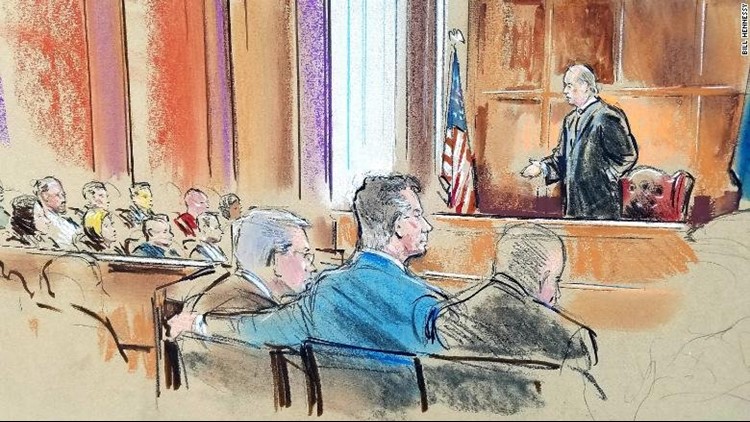The defense rested its case Tuesday morning in the trial against former Trump campaign chairman Paul Manafort without calling any witnesses, setting the stage for closing arguments Wednesday morning.
Manafort spoke for the first time in court during the trial, saying he will not testify.
Manafort told Judge T.S. Ellis that he would not testify during a brief questioning at the podium before the jury was brought in the room. Manafort is not required to testify because of his Fifth Amendment rights against self-incrimination. Ellis made this clear during his brief conversation with Manafort.
“You have an absolute right to testify before this jury,” Ellis said. “You have an absolute right to remain silent before this jury.”
On his way out of the courthouse, defense attorney Kevin Downing said that the defense rested its case because “the government has not met its burden of proof.”
Closing arguments are scheduled to begin at 9:30 a.m. ET on Wednesday, and Ellis encouraged both sides to keep them under two hours.
Manafort faces 18 charges of tax and banking crimes and has pleaded not guilty to all of the charges. The case stands as the first major test for special counsel Robert Mueller, who is currently leading the probe into allegations of Russian interference in the 2016 presidential election — including whether there was any collusion between President Donald Trump campaign associates and the Kremlin.
Why didn’t Manafort testify?
In some ways, it wasn’t a surprise that Manafort didn’t testify on his own behalf.
Any statements he made in court could be used against him in other trials — including his upcoming trial in Washington, DC, on foreign lobbying violations. The trial, which is expected to begin in mid-September, will be tried by some of the same prosecutors handling the current case in Northern Virginia.
If he were to testify, Manafort also would have also opened himself up to cross-examination by the prosecutors, and would have had to explain several emails and banking forms with his name and signature on them.
But it’s more surprising that the defense team did not present any evidence or call any witnesses, even people who could testify to Manafort’s character.
It’s possible the defense believes it has created enough doubt in the jurors’ minds through their questioning of prosecution witnesses over the last 10 days, and that it might have a leg up in the way jurors will be instructed to decide the case, especially given Ellis’ inclinations.
Earlier Tuesday, Ellis said he would instruct the jury to think about the “materiality” of the question of whether Federal Savings Bank founder Stephen Calk could contribute to Manafort allegedly defrauding the bank for $16 million in loans.
Calk, because he was a significant shareholder at the bank, could in theory loan to anyone he wished — even someone who was lying on paper — if Calk had the personal want for Manafort’s boost in politics, the defense team argued.
“In the end, I think the defendant makes a significant argument about materiality,” Ellis said Tuesday. “But in the end I think materiality is an issue for the jury.”
Judge denies request to throw out charges
Ellis denied Manafort’s request to throw out bank fraud and other charges against him, after considering a procedural motion where he could have intervened if he believed the prosecution hadn’t adequately presented its case to the jury.
The motion was for acquittal of the bank fraud counts related to Federal Savings Bank.
On Monday, Manafort’s team formally requested the court dismiss the case, a move generally seen as procedural following the prosecution’s presentation.
Manafort’s defense team believed the four Federal Savings Bank fraud charges could be dismissed because of previous comments made by Ellis suggesting the bank couldn’t be defrauded if its founder wanted Manafort to have the loans.
“We believe there’s not been a showing of materiality as to those counts, that the bank — the evidence suggests that the bank did not rely on any representations made by Mr. Manafort in granting those loans, and at this time, it would be appropriate to dismiss those counts,” defense attorney Richard Westling said in court Monday evening.



